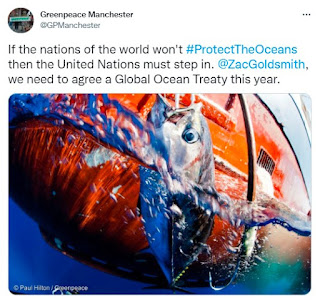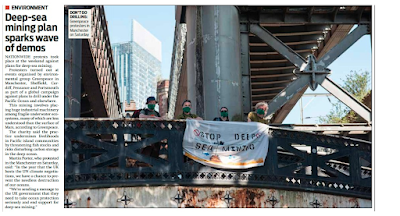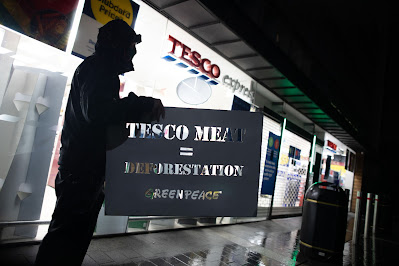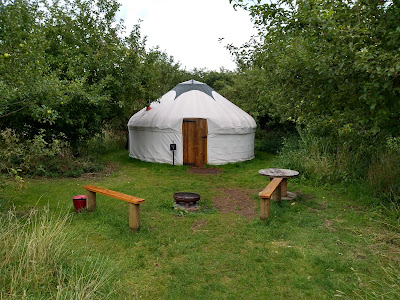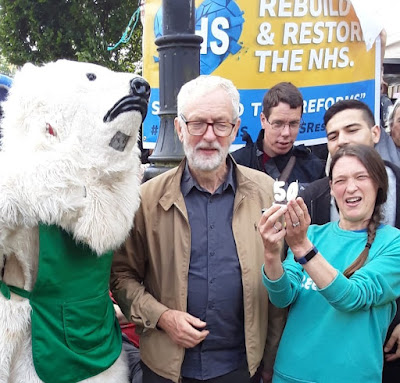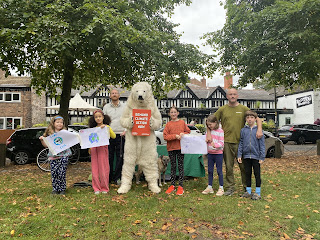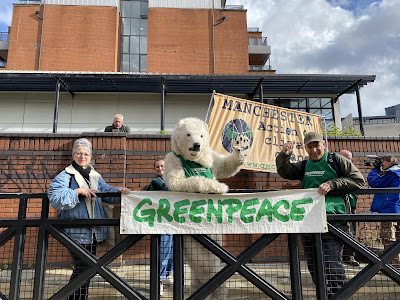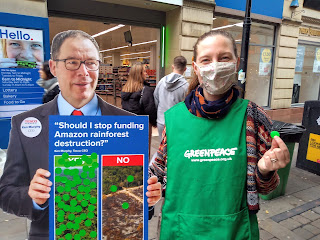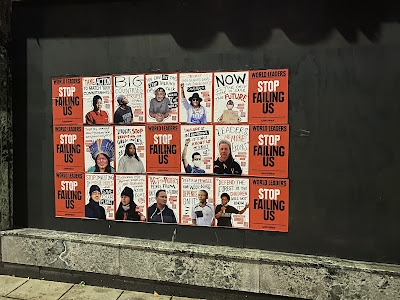The big news is a jury acquits the protesters who toppled Edward Coulston's statue into Bristol harbour.
The right-wing snowflakes were up in arms about it, but more sensible heads spoke up for the right of juries to let off whoever they wanted. As someone who had been found Not Guilty by a jury
Greenpeace, meanwhile, have us getting up very early to put up posters of their CEO Ken Murphy, as part of the campaign to stop them buying soya animal feed grown on what used to be the Amazon rainforest.
Protest of all types looks to be going to be a lot harder in future. I go to a 'kill the bill' demo and the GMP PLOs make a point of telling me they know who I am. At least I know who to go to in the event of an identity crisis.
Greenpeace, meanwhile, has us out and about in the rain making some nature art behind the Whitworth Art Gallery. I think we did all right.
I also get to take part in what a world record attempt. The aim was to have the most people ever bivvying out, which is camping without a tent. I wander off in the dark and make a shelter from the wind on the edge of Kinder Scout. It's clear night and the temperature drops below zero. Fortunately I get my fire ging before I freeze. The stars are amazing, but I sleep like a log and wake up staring at blue skies. It was a good night. A record of sorts was set, but Guinness isn't happy with the paperwork so it isn't an 'official' record.
The big news in February though was the Russian invasion of Ukraine. This would be the focus of some actions over the rest of the year, see me doing some work with refugees and transform my Twitter feed into a military sitrep.
March
A project for Greenpeace Unearthed has me running round the moors chasing fires. It's not a bad way to spend my time, although it does lead to one incident of being surrounded by gamekeepers who aren't too happy about it. It's an important story as our peat moorlands are a huge carbon sink, far bigger than our forests, and they are being destroyed so rich people can shoot fat birds.
In the end Greenpeace gets the info for their story from satellite photos.
I also go to a youth strike in Manchester, but it's a bit of a sad affair as the previous organisers have all gone off to university and not been replaced.
We also continue our campaign against Tesco, this time in the daylight.
April
I get to go to a party at a brewery. Cloudwater Brewery in Manchester have produced a beer to commemorate the 90th anniversary of the Kinder Scout Mass Trespass called Right To Roam, so they invite me along to give a little talk and give me free beer. I invite some of the Greenpeace group along and we have a good time.
There are more celebrations in Hayfield so I go along. In a tent I find the Labour Party, the Ramblers Association and the National Trust, in other words all the groups who opposed the mass trespass in 1932. There is at least the Morning Star, representing the more radical flank of the left who actually organised the event.
Patagonia ask me to lead their walk on the actual anniversary. They shut up their shop and bring a coach load of people out to hear me talk about the events of 1932. We walk the National Trust 'Mass Trespass Route' in excellent weather, collecting extra people as we go. It was a good day out and I hope my grandfather, an inveterate trespasser, would have been proud.
Two days later I was camped out in a layby near Grays wharf on the Thames in Essex waiting for a lorry carrying the Russian fuel to leave the terminal. I ended up being tasked to follow a Tesco tanker, and so I started an embarrassingly low speed pursuit across eastern England which eventually took me to Stalham on the edge of the Norfolk Broads. I get the photos and Tesco, who banned Russian Vodka, are caught bang to rights. The action was a huge success, reinforced six months later when the people who blocked the ship are acquitted, and no more Russian fossil fuels enter the the country, legally at least.
In May it was The Big Plastic Count. This is a bit of a hit, both on the streets and in the media, and helped keep pressure on companies to reduce the amount of pointless plastic they produce, trying to balance out the pressure Big Oil is putting on them to use more.
June
Something new in June was electric rallycross. World Rallycross had became the first FIA world series to go electric in 2021, and the rival American series Nitro Rallycross followed suit this year. They also came to Lydden Hill in Kent so we could see them first hand.
Once you got used to them sounding like Scalextric cars it was great motorsport. With 1000bhp on tap it they certainly shifted. The series uses identical cars that aren't based on road going vehicles, so the event was also notable for no car company or fossil fuel sponsorship at all. Rallycross is one of the friendliest sports around and so we were able to chat to the drivers about the cars. They loved them. Swede Robin Larsson won.
A quick change of clothes and I was off to work at the Glastonbury Festival for Greenpeace. I had a great team and it was a lot of fun, if rather hot. My duties included being a roadie for Easy Life and Self Esteem, and guarding the DJ booth for Mel C. I also had to test the drop slide and stir the shit - literally. Best of all though was hanging around in the Greenpeace crew area, which had its own bar, and fire pit, with people I'd not seen since before Covid.
Then there was the music: Seize the Day, Suzanne Vega, Kate Rusby, Jarvis Cocker, Skunk Anansie, Robert Plant, Gong, Steve Hillage, the Arcadia rave field, Greenpeace's own Rave Tree (running until 5AM and 20 metres from my tent) and the amazing Paul McCartney playing one of the best sets I've ever seen.
July
Unfortunately, after two years of dodging the virus, Covid finally got me at Glasto. Fortunately, thanks to three doses of Pfizer, I don't even get a single day off work. After a week I feel better and venture out to watch a game of T20 cricket. Phil Salt of Lancashire stumped Michael Pepper of Essex, and then in the next innings Pepper returns the favour by catching Salt.
Meanwhile, climate change gave us a summer like no other. Even in Glossop the Mercury hit 37 degrees, hotter than when I was on my honeymoon in Barbados or the work trip to Majorca all those years ago (it was a tough job, but somebody had to do it). Mountain rescue had to retrieve a guy who had a heart attack going for a walk and one of my elderly clients died in his home. It was a couple of days like I'd never experienced before, but will no doubt experience again.
It had cooled down a little by the time my boys and I went for our annual camping expedition to Eryri National Park. We climb the Glydders. Glydder Fawr is now two metres taller than last time I went up it, making it a 1000 metre peak at last.
August
The UK government started approving new North Sea oil and gas fields. Protests stopped the Cambo field last year, but there were more, including the Jackdaw gas field. The government approved the field, but Greenpeace put in a legal challenge.
I decided to do my bit it and organised a little protest in Manchester as part of a national day of action. Three members of the Greater Manchester Police service turned up to watch us, but all went well. Stephen Pennels gets the prize for best dressed activist.
The heatwave is drying up our reservoirs and so Greenpeace send a CBeebies presenter up to be filmed walking around the Woodhead reservoir. I advised on where to park and where to go, but I also think the Derwent makes a better place to show what a climate crisis looks like, so I pop out and film myself.
September
In September the Queen dies, having clung onto life long enough to sack Boris Johnson, which must have given her some pleasure. Her funeral gives us two weeks respite before Liz Truss's mini budget blows up the economy.
I remember the one time I met the Queen, which was a Greenpeace protest outside Canada House in 1998. A giant banner saying God Save Canada's Rainforest had been hung from Nelson's Column, and my job was to remove the crowd barriers to allow some fake Mounties through.
Back in 2022 we go to the Wilmslow Car Free Street Festival. The good citizens of the down give their chauffeurs the day off and leave the Rollers in the garage and have a party in the high street. It's not exactly Reclaim the Streets, but its fun.
Our new Prime Minister lifts the moratorium on fracking and so campaigning against shale gas starts again. I get interviewed on Radio Manchester about why this would not a good idea. This was one radio interview I did not need to prepare for.
Also this month I start doing some overtime helping Derbyshire County Council check on the welfare of the Ukrainian refugees people in the county are hosting. They're an interesting bunch of people, both the hosts and the guests.
October
It's Andy Burnham's fifth Green Summit and I go along. Compared to the first two there is a lot to celebrate now. Manchester is now on its way to getting a publicly owned, all-electric bus fleet, whilst Liverpool and Manchester are teaming up make the Northwest a renewable energy centre with a hydrogen plant and tidal barrage. Considering how little actual power Burnham has it's a great achievement. I also get a free lunch, free beer and the invaluable chance to talk to business leaders and local NGOs. The main thing the former want is a government policy. Almost any policy.
The opposite of a green economy, Liz Truss's ecocidal government, came to a sudden end only a week later, felled by a Labour motion on fracking. When the dust settles we realise that not only have we finally won a campaign that looked pretty hopeless nine years ago, but we took out a Tory Prime Minister in the process. That's a good result by any measure.
Also this month I meet Warm Homes Whitfield for the first time, a group of people who've come together to campaign for renewable energy and home insulation as they can't afford to heat their houses.
The Manchester Greenpeace Secret Squirrels help with the publicity.
Rather remarkably, the premier is in Glossop, hosted by Warm Homes Whitfield. I'm master of ceremonies and once I've collected Heather from the station and sorted out the audio-visuals, I host a debate about what it means for the people of Whitfield and what the government needs to do. There are some moving words and a few tears. Our MP doesn't turn up, which isn't a huge surprise, but it's a good start for a new group.
We then show the film in Manchester, and this time our invited guest turns up. Afzal Khan, MP for Manchester Gorton is complementary about our film and says he wants to show it in parliament, which is a result.
December
And so our campaigning year somes to an end. Manchester Greenpeace's final act is to take Sami, it's climate change fighting polar bear, for a pub crawl around the Christmas markets. She ends up in Night and Day bar listening to a set by the rapper Devlin. The bar has some legal issues, so it's great to be able to support it. Sami has a good time too.
So that was 2022. A war, a heatwave and some progress but not as much as we need. Roll on 2023.
























.jpg)










